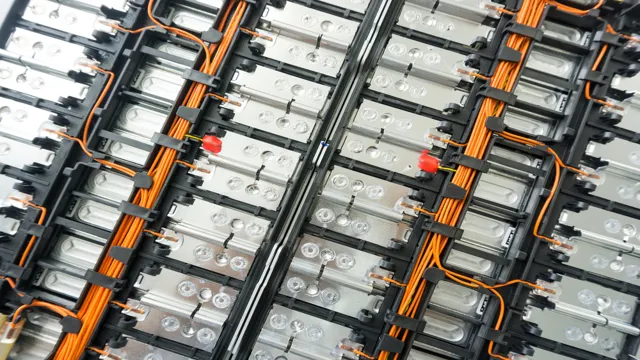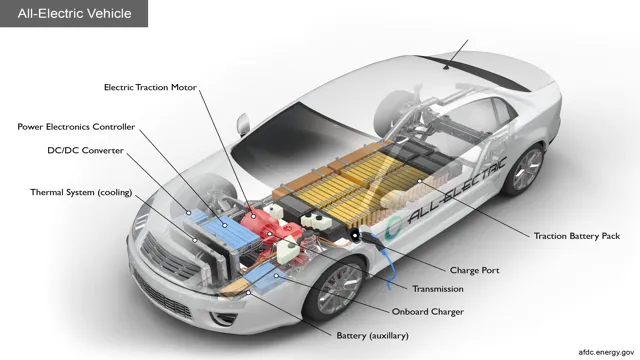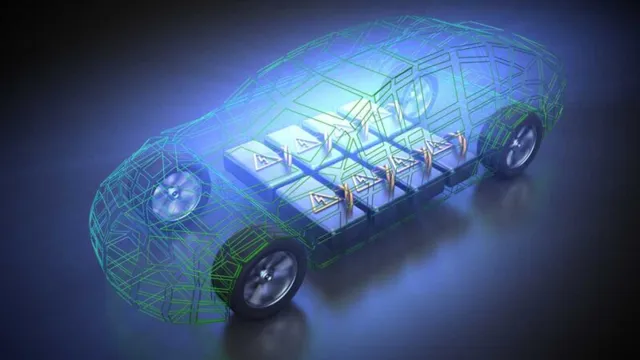Exploring the Average Weight of Electric Car Batteries: Understanding the Core Component of Green Transportation
Have you ever considered how much an electric car battery weighs? Well, the answer may surprise you. In fact, the weight of an electric car battery is one of the biggest concerns for automakers and consumers alike. Electric car batteries are essential to the functioning of electric vehicles, as they power the motor and provide energy storage.
However, the sheer weight of these batteries can be a hindrance to the overall performance and efficiency of the car. On average, electric car batteries can weigh anywhere from 500 to 1,000 pounds, depending on the model and make of the car. This weight is significantly more than the traditional gas-powered car’s battery.
But, why does the weight of the battery matter so much? The weight of the electric car battery affects many aspects of the vehicle, including its range, handling, and overall performance. A heavier battery can decrease the car’s range, making it less efficient and more costly to operate. Additionally, a heavier battery can also impact the car’s handling and stability, compromising safety and comfort for drivers.
However, as technology advances, there are efforts to make electric car batteries lighter and more efficient. New materials and designs are being developed to create batteries with higher energy density, allowing them to store more power in a smaller size and weight. The ultimate goal is to find a battery that strikes the perfect balance between weight and performance.
Overall, the weight of an electric car battery is a crucial aspect that affects the car’s performance, efficiency, and safety. As the demand for electric cars grows, we can expect to see more advancements in battery technology that aim to address these concerns.
What is the Average Weight of Electric Car Batteries?
When it comes to electric cars, the weight of the battery is a crucial consideration. After all, the battery is the power source for the vehicle’s motor. So, what is the average weight of electric car batteries? Well, it depends on the type of car and the size of the battery.
On average, a typical electric car battery weighs between 500 and 1,000 pounds. However, larger vehicles such as SUVs and trucks may have batteries that weigh upwards of 1,500 pounds. It’s important to keep in mind that the weight of the battery is just one of the factors that determines the overall weight of an electric car.
Other components such as the electric motor, chassis, and body also contribute to the vehicle’s weight. Nevertheless, advancements in battery technology are continually being made, which means that electric car batteries are becoming lighter and more efficient over time.
Research on Weights of Electric Car Batteries
Electric car batteries have been getting more potent by the year, but how much do they actually weigh? The average weight of electric car batteries varies by car model, with some weighing as little as 300 pounds, while others can weigh over 1000 pounds. However, most electric cars on the market today have a battery pack that weighs around 600 pounds. This weight can significantly impact the car’s overall weight, reducing its overall efficiency and adding to the car’s weight.
Therefore, car manufacturers are continuously researching ways to reduce the weight of electric car batteries while maintaining their power output. This research is vital, as a lighter battery can help increase the range of an electric car and reduce the overall cost of production. Ultimately, as advances in battery technology continue to emerge, we can expect to see even more lightweight, efficient electric car batteries in the future.

Factors Affecting Battery Weight
When it comes to electric car batteries, there are a number of factors that can affect the weight. The average weight of an electric car battery tends to be around 500 kg, although this can vary depending on the size and capacity of the battery, as well as the manufacturer. One factor that can affect the weight of an electric car battery is the type of technology used.
Some batteries use heavy materials, such as lead or nickel, while others use lighter materials, such as lithium-ion. Another factor is the number of cells in the battery. The more cells there are, the heavier the battery will be.
Additionally, the capacity of the battery can also play a role in the weight. Batteries with a higher capacity will typically be heavier than those with a lower capacity. Ultimately, the weight of an electric car battery is an important consideration for manufacturers, as it can affect the range and performance of the vehicle.
By using lighter materials and more efficient technology, manufacturers can work to reduce the weight of these batteries, making them more practical for everyday use.
Comparison with Traditional Car Batteries
When comparing electric car batteries to traditional car batteries, there are several key differences to consider, including their average weight. While traditional car batteries typically weigh anywhere from 30 to 50 pounds, electric car batteries can range from 500 to 1,200 pounds. This significant difference in weight is due to the fact that electric car batteries are much larger and more complex than their traditional counterparts.
However, despite their weight, electric car batteries have several advantages over traditional car batteries. For one, they are much more energy-efficient and can last a lot longer, making them a more sustainable choice. Additionally, electric car batteries can be charged much more quickly and efficiently than traditional car batteries, which often take several hours to recharge.
Overall, while electric car batteries are certainly heavier than traditional car batteries, their many benefits make them a worthwhile investment for those looking to reduce their carbon footprint.
Weight Comparison between Traditional and Electric Car Batteries
When it comes to comparing the weight of traditional car batteries with electric car batteries, there is a significant difference. Traditional car batteries are typically made of lead-acid and can weigh anywhere from 30-50 pounds. On the other hand, electric car batteries are made of lithium-ion and can weigh anywhere from 500-1,200 pounds, depending on the size of the battery pack.
While the weight difference may seem shocking, it’s important to remember that electric cars have far more range than traditional cars, which means the battery needs to be larger and therefore heavier. Additionally, electric cars have regenerative braking, which can help to recharge the battery while the car is in motion, and the overall weight of the car can also affect how much energy is required to operate it. Overall, it’s safe to say that the weight difference between traditional and electric car batteries is significant, but it’s a trade-off for the benefits that electric cars bring to the table – including reduced emissions and lower operating costs.
Environmental Impact of Battery Weight
When it comes to the environmental impact of battery weight, electric cars’ traditional batteries come up short in comparison to modern lithium-ion batteries. Traditional car batteries, typically made from lead-acid, contain toxic heavy metals and require a significant amount of energy to produce. On the other hand, modern lithium-ion batteries are much lighter and produce less harmful waste than their traditional counterparts.
In fact, the reduction in battery weight for today’s electric cars has significant environmental benefits, such as reducing the need for mining, transportation, and disposal of heavy metal batteries. Plus, lightweight batteries are compatible with high-performance cars and help increase their range. As we continue to shift towards a more sustainable future, electric cars with lighter, more efficient battery technology will play a considerable role in reducing pollution and saving energy.
Impact on Car Performance
The impact of electric car batteries on car performance is an important consideration for anyone thinking about buying an electric vehicle. In comparison with traditional car batteries, electric car batteries have a number of advantages which make them more efficient and cost-effective. The use of solid-state technology means that they have much greater energy density, which allows them to provide more power without taking up more space.
This allows electric vehicles to be lighter, faster, and more responsive than traditional cars without sacrificing range. Additionally, electric car batteries require much less maintenance than traditional car batteries, which can reduce the overall cost of ownership. Overall, the impact of electric car batteries on car performance is overwhelmingly positive, making electric vehicles a great choice for anyone looking for a greener, more efficient mode of transportation.
Lighter Batteries in the Future
As electric cars become increasingly popular, there has been a lot of discussion about the average weight of electric car batteries. Currently, the batteries used in electric cars are quite heavy and can add a significant amount of weight to the vehicle. This has led to concerns about the impact on the car’s performance and overall efficiency.
However, there is good news on the horizon. Researchers are working hard to develop lighter batteries that can still provide the same level of power and energy as the current models. This could potentially lead to more efficient and cost-effective electric cars in the future.
While there is still a long way to go before these new batteries become a reality, it’s exciting to think about the possibilities they could open up. With lighter batteries, electric cars could become even more widely adopted and accessible to a wider range of people, leading to a cleaner and greener future for everyone.
Technological Advancements in Battery Weight Reduction
Battery weight reduction is a significant priority in the development of new technologies, and recent advancements have shown promising results. With the increasing demand for electric vehicles and renewable energy storage, companies are looking for ways to make batteries lighter and more efficient. One exciting development is the use of new materials such as graphene and lithium-sulfur that provide better performance and lower weight.
Another promising trend is the development of solid-state batteries that eliminate the need for liquid electrolytes while also reducing the size and weight of the battery. In the near future, we can expect to see lighter and more powerful batteries that will revolutionize the way we store and use energy. With these innovations, we can look forward to a greener, more sustainable future where renewable energy is easily accessible and affordable for everyone.
Future of the Electric Car Battery Market
The electric car battery market is poised to undergo some incredible changes in the coming years. One of the most significant developments we can expect to see is the creation of lighter batteries that can store more energy. This will be achieved through a combination of advancements in both materials science and engineering.
The result will be more efficient batteries that can hold a greater energy charge, and which will be less likely to overheat or pose a risk to their users. As the market for electric cars continues to grow, these advancements will become increasingly important, since they will make it easier for consumers to make the switch to electric driving. It’s an exciting time to be in the electric car industry, and we can expect to see some truly incredible innovations in the very near future.
Conclusion
In conclusion, the average weight of electric car batteries is no longer a heavy burden on the environment or our wallets! With advancements in technology and increased production, the weight of electric car batteries has significantly decreased, making them more efficient and affordable for consumers. So, let’s embrace the weightlessness of the future and ride into a greener world!”
FAQs
What is the average weight of electric car batteries?
The average weight of electric car batteries is around 500-600 kilograms.
How does the weight of electric car batteries compare to traditional gasoline car batteries?
Electric car batteries generally weigh more than traditional gasoline car batteries due to their larger size and capacity.
Can the weight of electric car batteries impact the car’s overall performance?
Yes, the weight of electric car batteries can affect the car’s acceleration, handling, and overall energy efficiency.
Are there any advancements being made to reduce the weight of electric car batteries?
Yes, automakers and battery manufacturers are constantly researching and developing new materials and technologies to make electric car batteries lighter without compromising performance.







